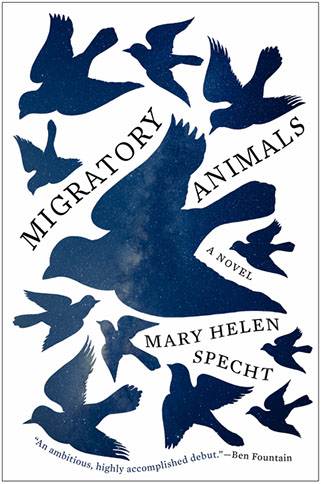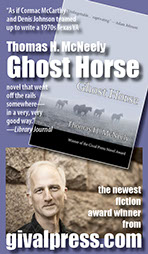
Connecting Texas books and writers with those who most want to discover them

TRAVELING?
TOP TEXAS
BOOKISH DESTINATIONS
Search our archives:

Lone Star Book Reviews
By Michelle Newby, NBCC
Contributing Editor

Michelle Newby is contributing editor at Lone Star Literary Life, reviewer for Foreword Reviews, freelance writer, member of the National Book Critics Circle, and blogger at www.TexasBookLover.com. Her reviews appear or are forthcoming in Pleiades Magazine, Rain Taxi, World Literature Today, South85 Journal, The Review Review, Concho River Review, Monkeybicycle, Mosaic Literary Magazine, Atticus Review, and The Collagist.
Lone Star Book Reviews
of Texas books appear weekly at LoneStarLiterary.com
MARY HELEN SPECHT Migratory Animals: A Novel
FICTION Harper Perennial, Paperback/Deckle Edge, January 20, 2015, 2015, 978-0062346032, 320 pp., $14.99 (also available in e-book)
reviewed 2.8.2015 by Michelle Newby, Contributing Editor
 “The Old English and High German word for building, buan, means to dwell. This signifies to remain, to stay in a place…to preserve and care for…”
“The Old English and High German word for building, buan, means to dwell. This signifies to remain, to stay in a place…to preserve and care for…”
What does “home” mean to you? Is it a place? A person? A particular period of time when you felt most like who you believed or wanted yourself to be? What happens when the meaning of home changes? How do we balance what we owe those we love and what we owe ourselves? Migratory Animals, Mary Helen Specht’s debut novel, unflinchingly tackles the hard stuff.
Specht employs five points of view to tell the story of a group of best friends from college who have each come to a crossroads. Flannery, prodigal daughter, sister, friend and flame, is “on the lam” in Nigeria from a difficult childhood and needy family. She has been there for five years and has built a career and fallen in love with a local. When Flannery returns to Austin to complete research that will allow her to secure funding so she can implement that research in Nigeria, she finally has to choose between her two lives. Her sister Molly has begun to exhibit symptoms of the genetic disease that killed their mother. Alyce, Flannery’s best friend, is (mostly) idly suicidal in a recurring depression. Flannery’s former flame Santiago is mired in the economic downturn of 2008 and still hoping she’ll come back to him. Harry is Alyce’s husband and Santiago’s business partner, trying to keep his family and business afloat. “All the things one thinks it is impossible to bear and yet. And yet. Who does not have to bear them?”
Migration is a powerful metaphor. So far this group of friends has moved as a flock. But peoples’ needs and circumstances change. Migratory Animals is a poignant examination of group dynamics, the individual’s role in that group, and the necessary adjustments and shifting alliances when an individual’s needs no longer allow him or her to perform the their assigned functions within the group. Every migratory pattern has a few outliers. Duty is a recurring theme, particularly the duty to witness. If a tree falls in a forest . . .
This is not an action novel, not plot-driven but character-driven, and the pacing can be a bit slow. We spend most of our time inside these characters’ heads. Fortunately, Specht has created vivid and complete characters with compelling backstories. My only quibble with them is that they are almost self-consciously multicultural—but as such they mirror Austin quite well.
Not every circumstance will turn out to have a happy resolution, but the ending is satisfying. A couple of threads are left to hang, but then that’s life, isn’t it?
* * *

WHERE IN TEXAS?

BOOKISH TEXAS
Subscribe to our weekly e-newsletter to read Michelle Newby's Texas Bookish Events from around the state.

![]()
![]() LONE STAR LITERARY LIFE copyright © 2015–18 Paragraph Ranch LLC • All rights reserved • CONTACT US
LONE STAR LITERARY LIFE copyright © 2015–18 Paragraph Ranch LLC • All rights reserved • CONTACT US
